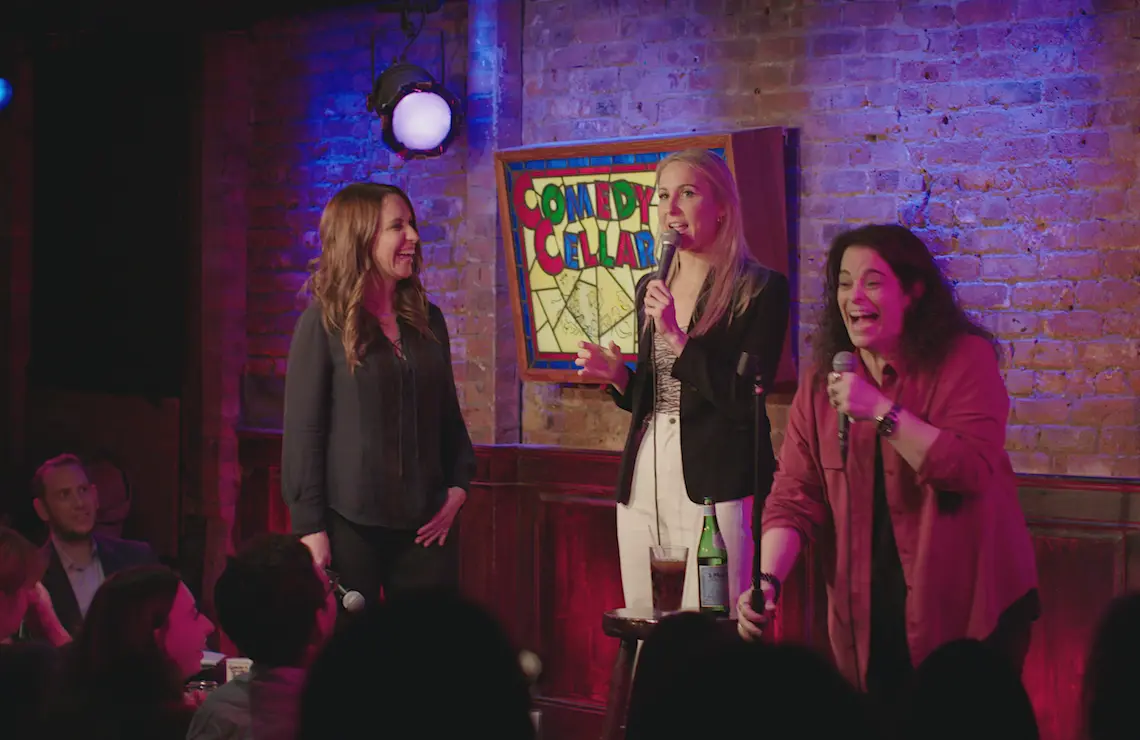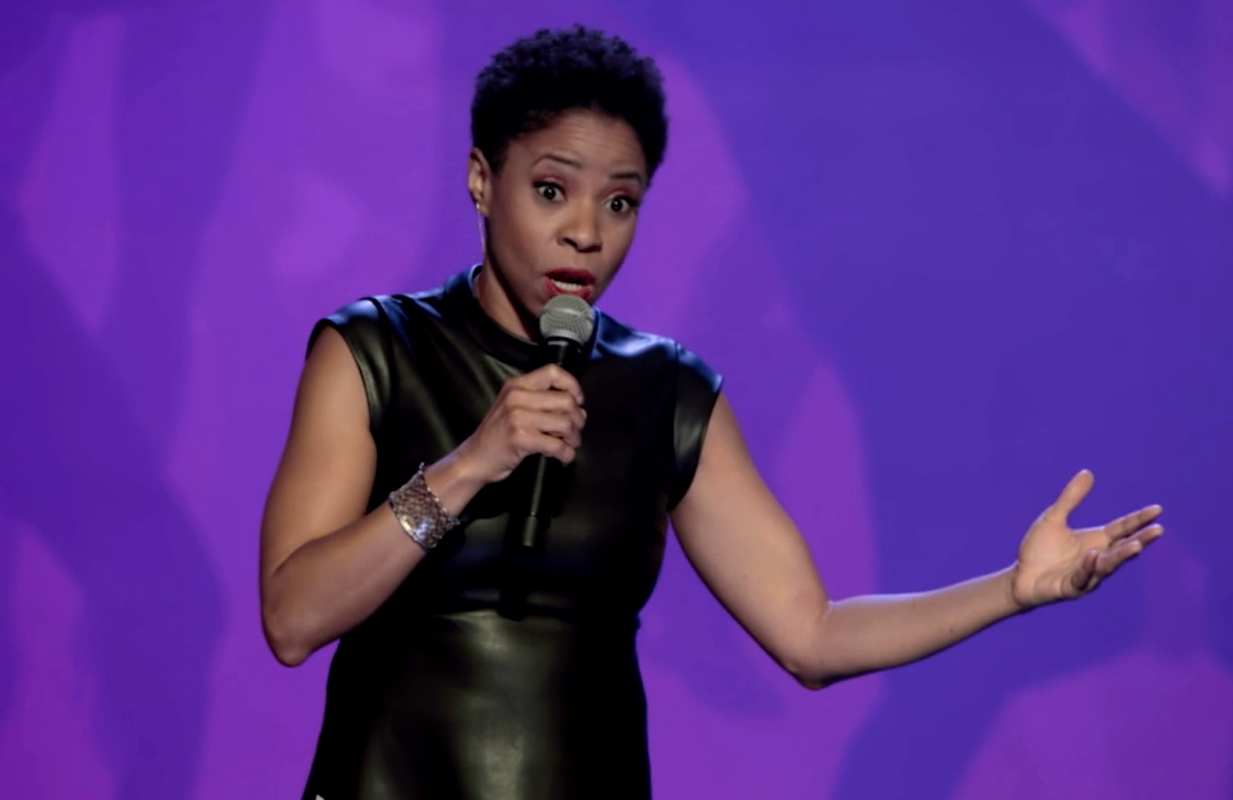Hysterical Tries (and Fails) to Tell the Story of Women in Standup
-
 Rachel Feinstein, Nikki Glaser and Jessica Kirson in Hysterical. (Photo: FX)
Rachel Feinstein, Nikki Glaser and Jessica Kirson in Hysterical. (Photo: FX)From Richard Pryor to Jerry Seinfeld, Joan Rivers to Tig Notaro, comedians have long been a favorite subject for documentarians. But given the ever-growing canon of non-fiction storytelling about the craft, any filmmaker attempting to add to the pile should be very sure she has something new to say. With Hysterical, director Andrea Nevins failed to convince me that she does.
I'm actually not even sure how to summarize the film. In short: it's a 90-minute look at what it's like to be both a standup comic and a woman. As we meet Nevins's various interview subjects — veterans like Sherri Shepherd, Judy Gold, and Margaret Cho; seasoned pros like Nikki Glaser, Marina Franklin, and Fortune Feimster; and relative newcomer Kelly Bachman — we jump around from their early childhood memories to the history of women in the field to the ways sexism and outright misogyny have affected their careers. Nevins tries to end on a hopeful note, highlighting some of her profilees' signal achievements and the ways women are increasingly able to support and promote each other.
It's not that I don't think women in comedy are worth talking about. It's that I don't know what point Nevins is trying to make about them, because this film is all over the place. Her interviewees bring up pioneering figures who were important to them, like Totie Fields, Moms Mabley, and Phyllis Diller, but Nevins barely elaborates on who they were, never mind detailing their successes and challenges in their own eras. She touches on the pay gap (which is even worse for women of color), but maybe that would have been more robust as part of a larger discussion about inequity of pay and opportunity across the entertainment industry? It gestures toward being a report on the state of comedy in the post-"Me Too" era — Bachman's refusal to ignore Harvey Weinstein in the audience at one of her shows in 2019 gets a thorough airing — but that idea is only briefly considered too.

That Nevins just may not know much about comedy is tipped off by her use of footage from the scripted film Punchline as though it is illustrative of what comedy is actually like. Maybe that's why she blindly accepts her subjects' framing of New York's Comedy Cellar as a venerable performance venue without noting that its owner, Norm Dworman, allowed admitted sex offender Louis C.K. to perform there as recently as 2018; seems like that would be relevant in a documentary that, elsewhere, elucidates female comics' safety concerns revolving around their shows and even their career-related travel and accommodations. You could say that maybe Nevins didn't know about Jeff Ross's alleged relationship with an underage girl when she included footage of him kibitzing with Franklin at the Cellar before a set when she's going to talk about the breast cancer diagnosis she's just received ("You have and have always had great tits, just so you know," he tells her), except that later there's a montage of headlines about various male comedians' sexual misconduct — C.K., of course, but also Bill Cosby, Bryan Callen, T.J. Miller, and Chris D'Elia, among others... including Ross. Maybe cut the scene of Ross chilling with his female colleagues and commenting on one of their currently ailing bodies? You can't say that Nevins doesn't know a joke from Lisa Lampanelli's old act — "Wait a minute, you're Hispanic?! Oh my God, you look so employed" — is racist, but this also passes without comment; maybe she thinks Lampanelli's choice to wear this t-shirt for her contemporary interview answers any questions Nevins might have about the offensiveness of her comedy. (We do learn that Lampanelli has retired from comedy and is now working full-time "in self-help," but her reasons — which include regrets about the content of her old act — don't make it into Nevins's cut.)
The gaps in Nevins's command of the comedy world, or just her lack of connections and access, may also be why we don't hear directly from some comics who would probably have a lot to say about what it's like for women in comedy in 2021. We hear tell of Mo'Nique's lawsuit against Netflix for its lowball offer on a comedy special: why don't we hear from her, or at least hear more about the case? Rape and sexual assault both in comedy and as a subject of comedy are addressed: why not talk to Beth Stelling or Natalie Palamides, whose 2020 specials Girl Daddy and Nate, respectively, dealt with this specifically? Why not reach out to alt-comics like Kate Berlant or Emily Heller? Why not include comics who identify as trans?
Admittedly, I watch more standup than most, and have since I was a kid; I listen to lots of comedy podcasts and have heard many hours — weeks, probably — of comics talking about their influences and their work. I guess my question after watching Hysterical is why it seems like Nevins didn't. Even a comedy dabbler will, I think, find this vague mess frustrating, shallow, and amateurish. (I didn't even get into the chapter breaks, with fakey dictionary definitions of various relevant pieces of comedy jargon: one of them is just "comedy" and it's... not the first one.) I would have been happy to watch a clear, focused, and unflinching look at women in comedy today; it's too bad Hysterical is so broad.
Hysterical airs on FX April 2nd at 9:00 PM ET.
Writer, editor, and snack enthusiast Tara Ariano is the co-founder of Television Without Pity and Fametracker (RIP). She co-hosts the podcasts Extra Hot Great and Again With This (a compulsively detailed episode-by-episode breakdown of Beverly Hills, 90210), and has contributed to New York, the New York Times magazine, Vulture, Decider, Salon, and Slate, among many others. She lives in Austin.
TOPICS: Hysterical, FX, Andrea Nevins, Bonnie McFarlane, Fortune Feimster, Harvey Weinstein, Jeff Ross, Judy Gold, Kelly Bachman, Lisa Lampanelli, Margaret Cho, Marina Franklin, Nikki Glaser, Sherri Shepherd